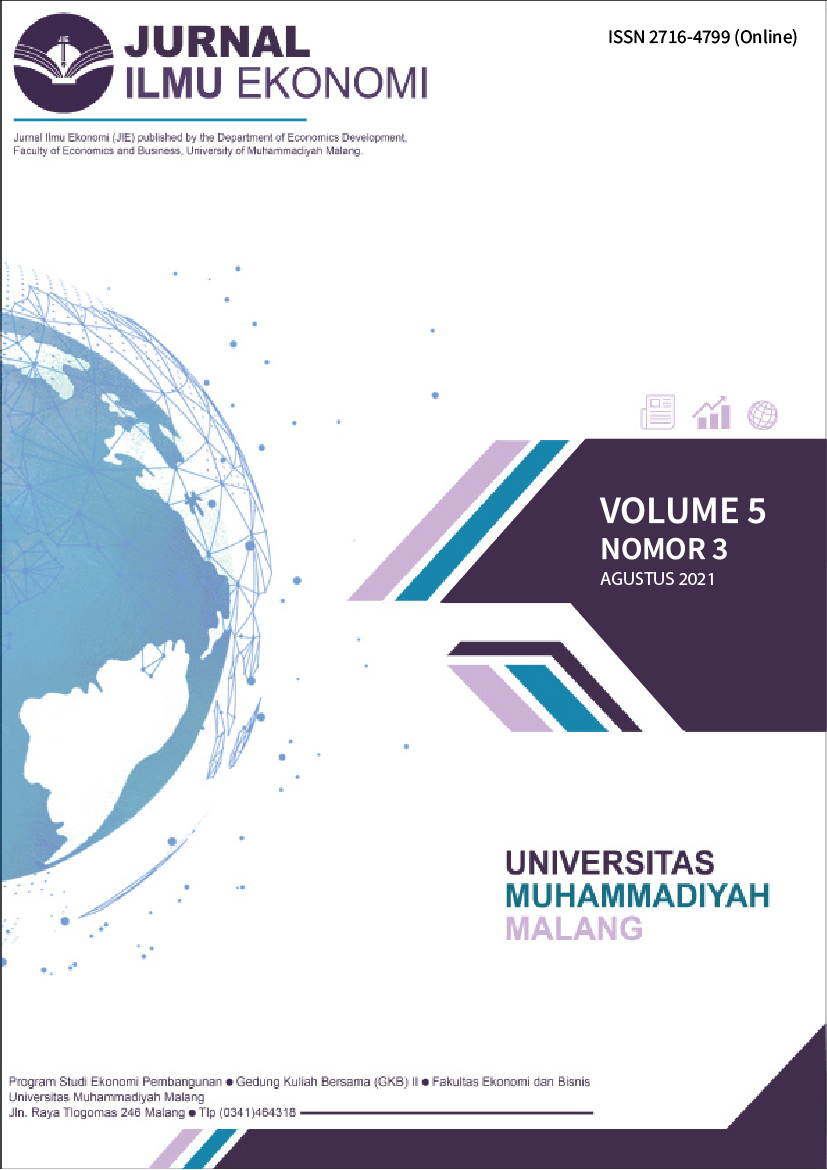ANALISIS FAKTOR-FAKTOR YANG MEMPENGARUHI CADANGAN DEVISA DI INDONESIA
DOI:
https://doi.org/10.22219/jie.v5i3.16250Abstract
The purpose of this study is to analyze what factors affect foreign exchange reserves in Indonesia. The focus in this study is the variables that affect changes in foreign exchange reserves in the 1999-2019 period are non-oil and gas exports, the rupiah exchange rate, foreign debt and inflation as independent variables. Using an open economy model and Keynes's balance of payments, the analytical tools used in this study are the PAM regression model (Partial Adjustment Model) and the adaptive expectation model to see the long-term and short-term effects of the independent variable on the dependent variable. The results of this study show that simultaneously non-oil and gas exports, the rupiah exchange rate, foreign debt and inflation affect Indonesia's foreign exchange reserves, while partially non-oil exports and the rupiah exchange rate significantly and positively affect Indonesia's long-term and short-term foreign exchange reserves, while debt foreign exchange and inflation are not significant and negatively affect long-term and short-term foreign exchange reserves. Non-oil exports, rupiah exchange rate, foreign debt and inflation can explain Indonesia's foreign exchange reserves of 97%, of which the remaining 3% is explained by other variables not included in this study.
Downloads
References
Asmanto, Priadi, and Sekar Suryandari. 2009. “Cadangan Devisa, Financial Deepening Dan Stabilisasi Nilai Tukar Riil Rupiah Akibat Gejolak Nilai Tukar Perdagangan.” Buletin Ekonomi Moneter dan Perbankan 11(2).
Basuki, Agus Tri. 2014. “Regresi Model PAM, ECM Dan Data Panel Dengan Eviews 7.” : 1–75.
Damondaar N. Gujarati. 2007. Dasar-Dasar Ekonometrika. Edisi Keti. Jakarta: Erlangga.
Gandhi, Dyah Virgoana. 2006. Seri Kebanksentralan Pengelolaan Cadangan Devisa Di Bank Indonesia.
Kuswantoro, Muchammad. 2017. “Analisis Pengaruh Inflasi, Kurs, Utang Luar Negeri Dan Ekspor Terhadap Cadangan Devisa Indonesia.” Tirtayasa Ekonomika 12(1): 146.
Rochman, Asep Maulana. 2015. “Pengaruh Inflasi, Kurs Rupiah, Utang Luar Negri Dan Ekspor Terhadap Cadangan Devisa Indonesia.”
Sayoga, Pundy, and Syamsurijal Tan. 2017. “Analisis Cadangan Devisa Indonesia Dan Faktor-Faktor Yang Mempengaruhinya.” Jurnal Paradigma Ekonomika 12(1): 25–30.
Sukandar. 2020. “Pengaruh Ekspor Migas Dan Non Migas Terhadap Cadangan Devisa Indonesia 2016-2019 Dalam Prespektif Islam.” : 6.
Susanti, Tiyas. 2019. “Pengaruh Utang Luar Negeri, Ekspor,Kurs Dan Inflasi Terhadap Cadangan Devisa Indonesia.” 8(2): 2019.
Syarifuddin, Ferry. 2015. “Konsep, Dinamika Dan Respon Kebijakan Nilai Tukar Di Indonesia.” Bank Indonesia (24): 1–101.
Tambunan, T. and Wijanarko. 2000. Perdagangan Internasional Dan Neraca Pembayaran: Teori Dan Temuan Empiris. LP3ES.
Downloads
Published
How to Cite
Issue
Section
License
Copyright (c) 2021 Jurnal Ilmu Ekonomi JIE

This work is licensed under a Creative Commons Attribution-ShareAlike 4.0 International License.
Authors who publish with this journal agree to the following terms:
- For all articles published in the JIE (Jurnal Ilmu Ekonomi), copyright is retained by the authors. Authors give permission to the publisher to announce the work with conditions. When the manuscript is accepted for publication, the authors agree to the automatic transfer of non-exclusive publishing rights to the publisher.
- Authors retain copyright and grant the journal right of first publication with the work simultaneously licensed under a Creative Commons Attribution-NonCommercial-ShareAlike 4.0 International License that allows others to share the work with an acknowledgement of the work's authorship and initial publication in this journal.
- Authors are able to enter into separate, additional contractual arrangements for the non-exclusive distribution of the journal's published version of the work (e.g., post it to an institutional repository or publish it in a book), with an acknowledgement of its initial publication in this journal.
- Authors are permitted and encouraged to post their work online (e.g., in institutional repositories or on their website) prior to and during the submission process, as it can lead to productive exchanges, as well as earlier and greater citation of published work (See The Effect of Open Access).
This is an open access article and licensed under a Creative Commons Attribution-NonCommercial-ShareAlike 4.0 International License








